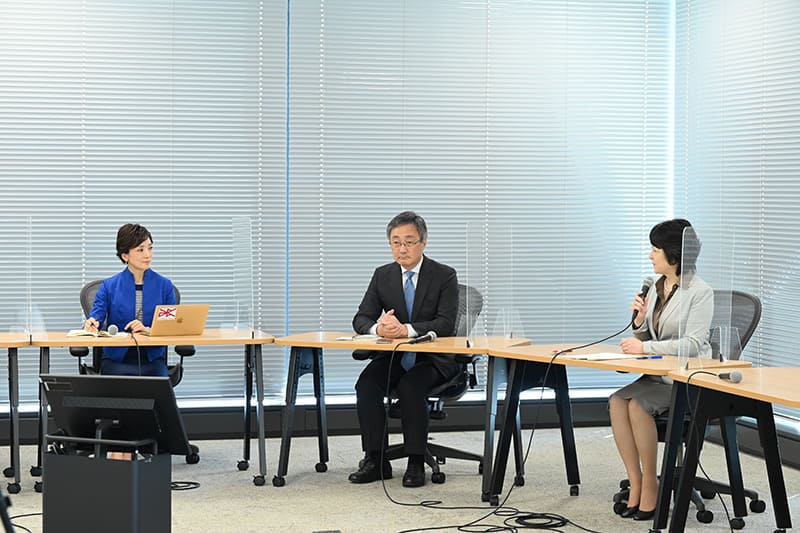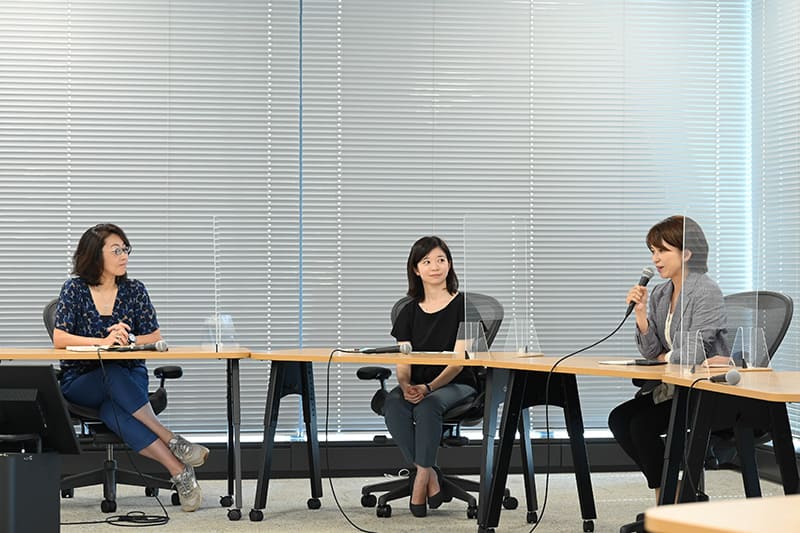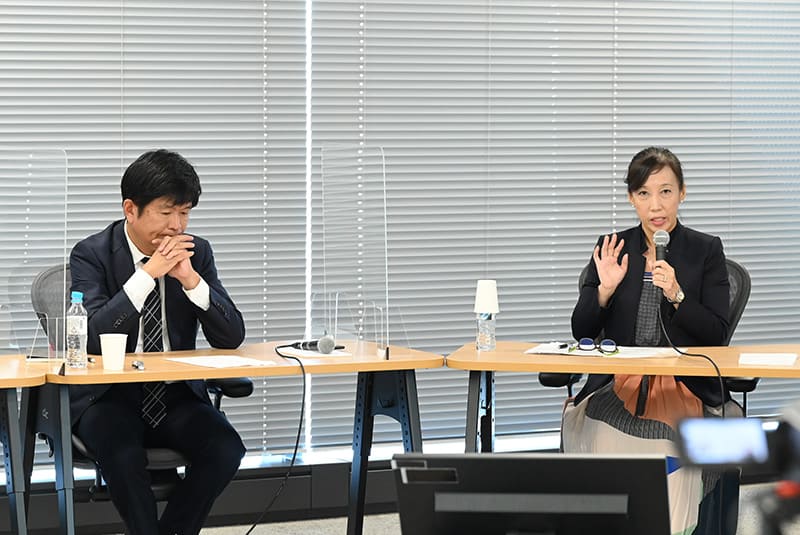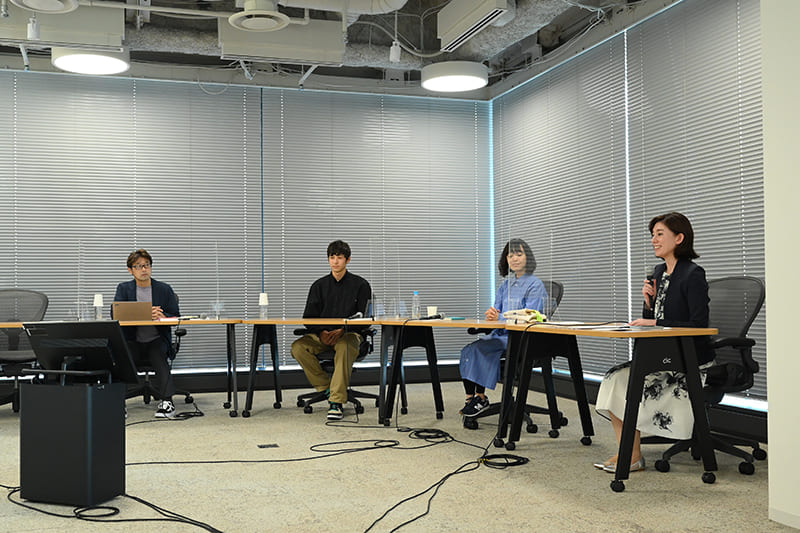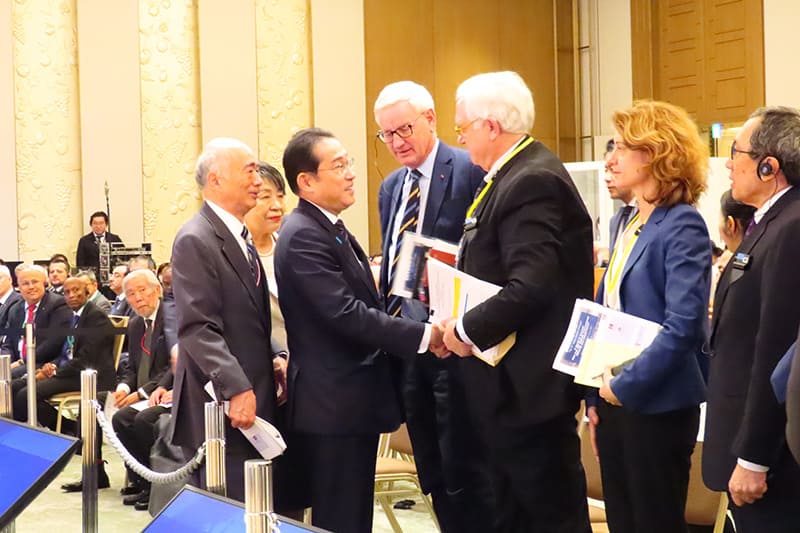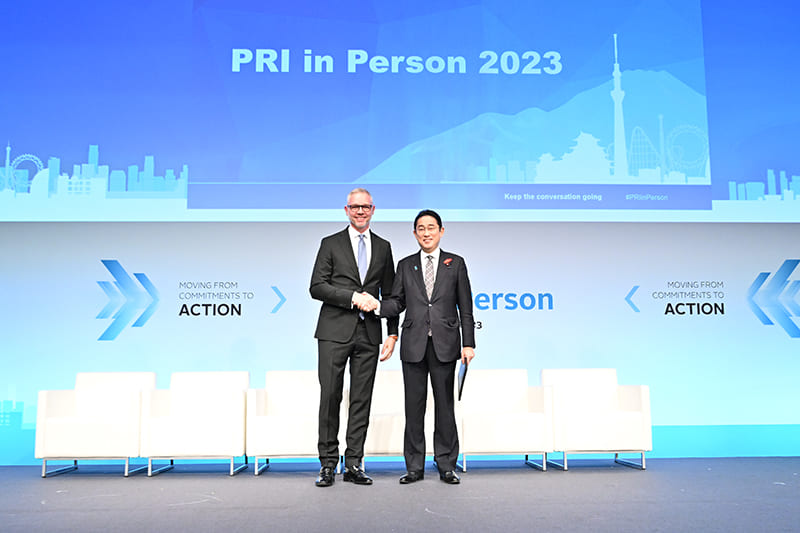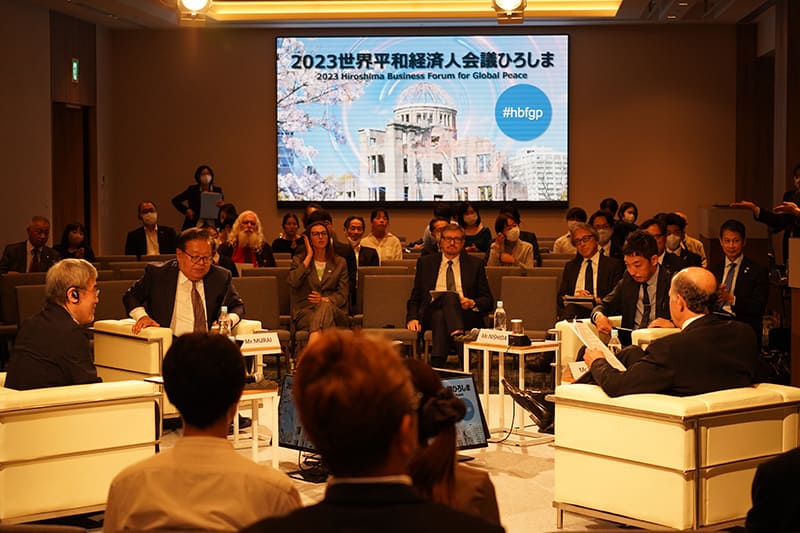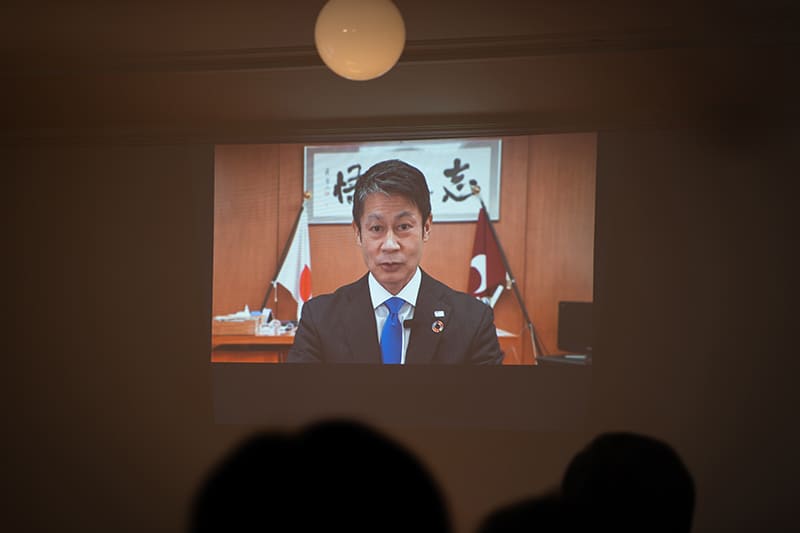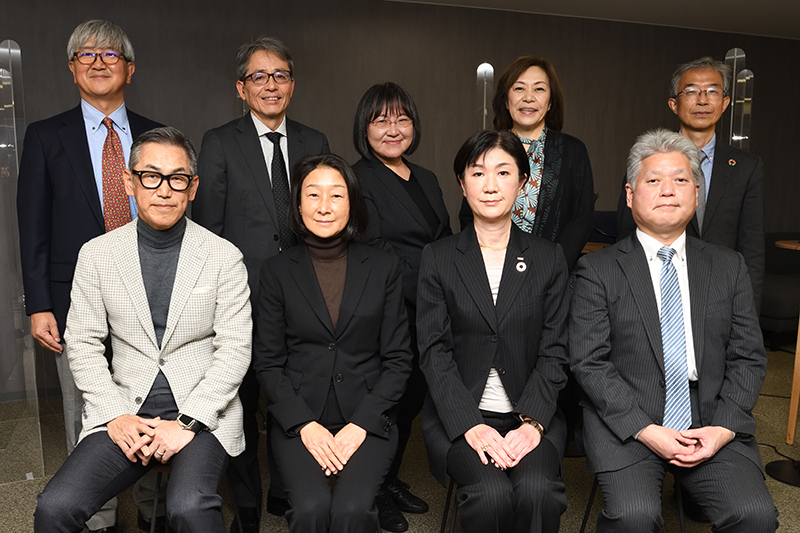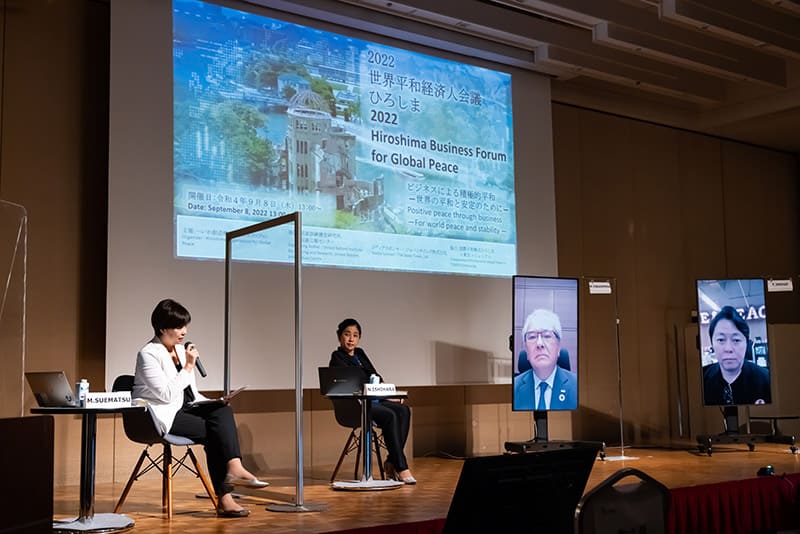November 01, 2021
Peace is everyone’s business, Hiroshima forum says
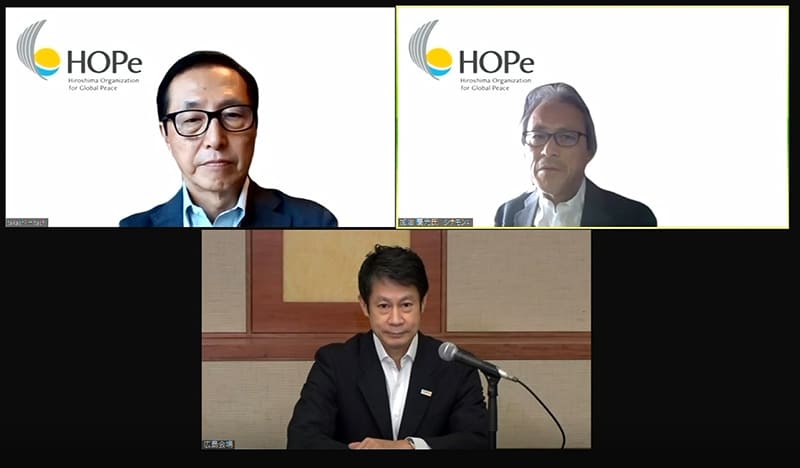
Summer, with memorial days marking war-related events and the Bon period to welcome ancestral souls, is perhaps when Japanese think more about peace than at any other time of the year. This may have been even more true this year, when the Olympic Games, a celebration of peace, were held in an unprecedented form in Tokyo and the COVID-19 pandemic continued.
Against this backdrop, the 2021 Hiroshima Business Forum for Global Peace was held online on Sept. 8 and 9 with the purpose of sharing among various stakeholders the importance of global peace as a premise for business. It featured multifaceted discussions about the relationship between business and peace-building, and encouraged the business community to recognize its role in contributing to the realization of a peaceful world free of nuclear weapons.
This conference was organized by the Hiroshima Organization for Global Peace, a network of the Hiroshima prefectural government and 19 other organizations, supported by the United Nations Institute for Training and Research and sponsored by The Japan Times. The organization, headed by Hiroshima prefectural Gov. Hidehiko Yuzaki, has multiple functions — including research, human resource training, communication of information, community-building and resource accumulation — related to global peace and the abolition of nuclear weapons.
The theme for this year’s forum was “How we can revitalize the world and build an even better global community in 2021: Conquering the pandemic and overcoming discrimination, disparities and national favoritism.” Beginning the event, the keynote lecture by Yoichi Funabashi, the chairman of the Asia Pacific Initiative, emphasized the role of business leaders in making efforts to prepare for emergencies and speaking out against populism and nationalism in the current world, where there are not only military threats but also ones such as climate change, pandemics and cyberattacks.
Seven sessions took place, covering diverse topics such as climate change, equitable access to essential medical supplies, geographical risk in business, the gap between the rich and the poor, dual-use technologies, and diversity and inclusion.
Designing commons for all
In the last session, moderated by Narumi Yoshikawa, a professor at the Hiroshima Business and Management School in the Prefectural University of Hiroshima, four panelists exchanged thoughts under the theme “Integration between business administration and peace by way of commons.”
Introducing the session, Yoshikawa said one of the major missions of researchers in the field of business and management is to figure out how best to design commons — resources available to all — and kick-started the discussion by asking why now is the time to contemplate peace and management.
Yoshinori Yokoyama, the dean of the Hiroshima Business and Management School, whose mother and brother were exposed to radiation in the atomic bombing of Hiroshima when he was 2 years old, explained that managing the market of peace is essential for proactively seeking peace rather than merely settling for a state of no war.
“Nobody opposes peace. But there is no deadline for peace to be achieved by. A sense of urgency is lacking,” Yokoyama pointed out. He said that the best way to accelerate the process of achieving peace is to make it marketable, just like wars and conflicts are used to sell arms, which unfortunately has been the practice all over the world since ancient times.
A more recent and positive example is the marketing of sustainability. Yokoyama noted that the starting point for the global community to market sustainability was in 1972, when the United Nations Environment Programme was launched as a result of the U.N.’s Stockholm Conference on the Human Environment. Governments and the financial sector are also engaged in creating markets for sustainable products, services and solutions. “We should do the same for peace — turn peace from an abstract notion to something concrete,” Yokoyama said.
He noted that companies are transforming, as seen in shifts from shareholder value to stakeholder value and in efforts in line with the U.N.’s sustainable development goals. “We are one step away from witnessing merchants of peace,” he said, stressing that this new spirit of the age goes beyond the idea of de-growth.
Marketing peace
Cats Edo, a department head and professor at the Hiroshima Business and Management School, also stated that businesses are starting to search for ways to create peace by using various marketing tools. Behind this change is an increasing number of global issues, such as the more-frequent natural disasters that climate change is bringing and the ongoing pandemic, that can only be addressed through the collective efforts of all sectors.
How the private sector can grow while also taking action to improve society and achieve peace is key because there are limits to what governments can do. “Companies are starting to focus on creating social value and economic value at the same time,” Edo said, adding that the world is close to establishing the new market of peace.
He went on: “What is required of marketing is how to put the idea of the common good into practice. The perspectives of social marketing can change people’s behaviors and actions.” He highlighted the need to go beyond social responsibilities and pursue the paradigm of peace business in sustainable ways.
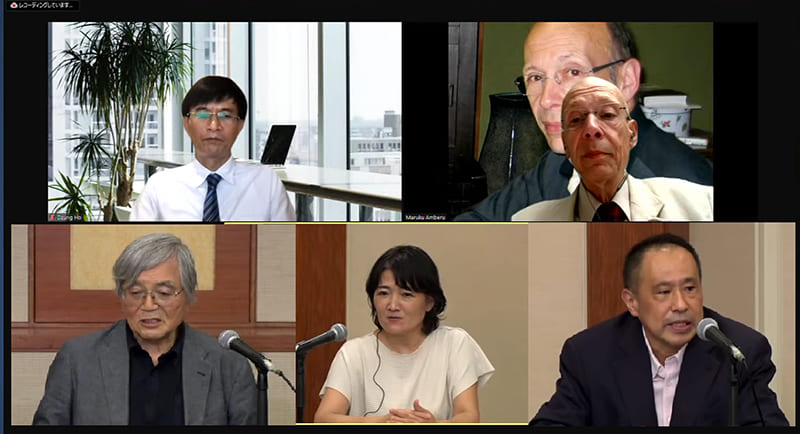
Vietnam’s example
Ho Chi Dzung, the head of research and development at the PeopleOne Joint Stock Co. in Vietnam, added: “Growing evidence shows that firms should not be excluded from the stakeholders working toward peace. Firms can provide stability and foster peace in broad ways.” Based on the principle that peace is a key component of sustainable development, he shared some examples of social issues in Vietnam and how they need to be dealt with by companies for the sake of their own growth.
He said the unemployment insurance system and social security system in Vietnam are still incomplete, and further efforts need to be made in providing jobs in sustainable ways, such as by ensuring growth in high-tech industries through technology transfers between industry and academia as well as among companies both domestically and internationally, and by complying with international standards and laws. He said transfers involving the information technology sector — especially in the field of digital telecommunications, including fiber optics plus 4G and 5G technologies — and other high-tech fields have had some successful examples. “One of them is the manufacturing and launch of the MicroDragon satellite, an Earth-observation satellite developed by 36 engineers in Vietnam under the training and guidance of Japanese experts” to monitor ocean color and assess coastal water quality, he said.
However, he noted that technology transfers from foreign countries account for only about 1% of the total and that “the technology transfer activities between academic institutions and firms are limited, narrowly scoped and spontaneous.” Ho stressed that more can be done to further the sustainable growth of the technology sector in Vietnam to secure jobs and support the economy.
Referring to the yellow card given to Vietnamese seafood by the European Commission in 2017 over a lack of action in addressing illegal, unreported and unregulated fishing activities plus worsening coastal pollution due to the rapid growth of marine tourism, Ho stressed the importance of complying with international standards and conducting business in sustainable ways to secure continuous growth.
“Firms need to protect the interests of all stakeholders while not creating conflicts between them — that is the basis for firms to develop sustainably and create cooperation between different communities,” he said.
Putting solidarity first
Marc Humbert, an emeritus professor of political economy at the University of Rennes in France and co-founder of the collective project PEKEA (political and ethical knowledge on economic activities) and the informal intellectual collective Convivialist International, said an absence of limits and a lack of solidarity have brought the world the dangers of depleted natural resources and a degraded environment.
Humbert said that instead of continuing the Western principles that allow individuals and enterprises free rein in order to profit and let scientists and technicians exploit natural resources and transfer their findings and technologies to industry for greater profits, “We need to change general ethics and political philosophy from that of freedom to do what you can to that of solidarity to do what you can to help others.”
He added that solidarity is one of the key components of a “convivial” (“living together”) society built and maintained for the common good along with “responsible moderation to avoid excessiveness, equality to eradicate all discrimination” and “creative deliberation.”
Yoshikawa concluded the session by commenting, “Building experience through practice is important in acquiring peace, an invaluable asset in economic activities.”
The 2021 declaration
As a fruit of the two-day conference involving more than 30 leaders and experts from enterprises, academia, international and government organizations and nonprofits, the 2021 Hiroshima Declaration was announced to clarify the current global challenges discussed in the seven sessions and to call for concrete action.
The appeal marks the year 2021 as the starting point to “build back better” and aims to achieve a hopeful future through contributions to peace that businesses can make. It encourages the creation of an international order to promote a virtuous circle of peace and the economy with a long-term perspective and suggests that a true utilitarianism of pursuing the benefit of others — in other words, multiple stakeholders — is necessary to realize one’s own benefit.
In the concluding panel discussion, Yuzaki said, “Utilitarianism in a true sense is the driver for economic development.” He also stated, “As is apparent in the appeal, businesses are changing and advancing from the pursuit of profit to an active involvement in creating peace as the basis for business prosperity,” and highlighted that making social contributions is becoming mainstream in business, not something that companies do on the side and only because they are required to.
Takashi Mitachi, a Boston Consulting Group senior adviser, said in his concluding remarks that people should not blindly believe that what they have now will always stay that way. Many people have already suffered loss due to the pandemic, climate change, natural disasters and the like. “We need to protect and reinforce what we have — human security in a broad sense — which also serves as the basis for business,” Mitachi said. Highlighting that the pandemic made people more aware of this, Mitachi stressed that business leaders are starting to think about how to contribute to realizing peace in their own fields, and that peace provides the basis for further economic development, which allows more people to enjoy its fruits. “I hope we enhance this good cycle,” Mitachi said.
The Tokyo session
On Oct. 8, the Hiroshima Business Forum for Global Peace Tokyo Session, a side event of the one held in Hiroshima, took place online in a bid to build a bridge between Hiroshima, the center of global peace, and Tokyo, a global business hub. One of the speakers at the first Tokyo panel session, Ken Shibusawa, the CEO of Shibusawa and Company Inc. and chairman of Commons Asset Management Inc., said peace is like air: “We take it for granted, but once it is lost, we are in big trouble. Peace is not a natural phenomenon. We have to be aware that each one of us is a player in peace-building.” In the same session, Kristina Yasuda, an identity standards architect at Microsoft Corp., also said that the range of peace issues is expanding and there are more issues to be discussed, such as how to maintain peace in the cyberworld.
Subsequent lectures and panel discussions developed insights into peace from various aspects including human well-being, diversity and inclusion, economic security and business ethics.
The Tokyo session invited a secret guest to speak before the last panel discussion: Gaito Amano, a fifth-grade student who in January started a project called Dear My Future Friends. He explained that the project’s aim is to make friends with children from 196 countries and join the world into one team sharing ideas. “I believe that children have sensibility and talents that adults do not have. Now is the time that we should connect to each other. So I started writing letters to my future friends in various countries,” he said.
He prepared 10 questions such as “What makes you happy?” “What do you think the future is going to look like?” and “What can we do for the Earth?” to better understand the environments, cultures and values of his future friends’ countries. So far he has communicated online with children from 20 countries — including India, Singapore, Lebanon, Cambodia and Denmark — and they have gotten to know each other and exchanged ideas about what they can do together to make the world a better place. Many embassies and consulates of countries where he does not yet have friends are now helping him reach out to children in their country.
Hiroshima Gov. Yuzaki expressed hope in his speech during the Tokyo session that those who have received messages of peace through events like this will take action toward peace, and that such actions will spread to the world. Fifth-grader Gaito is surely one of those who have taken a step forward and started to engage people from around the world in the pursuit of peace.
Peace is not something that is easy to attain, although it is very much wanted by all human beings. The 2021 Hiroshima Business Forum for Global Peace and its Tokyo session helped to define peace in concrete ways and to propose specific actions so that it makes more sense for businesses to actively engage in and commit to creating peace.
………………………………
All of the photos have been provided by the Hiroshima Business Forum for Global Peace organizers.
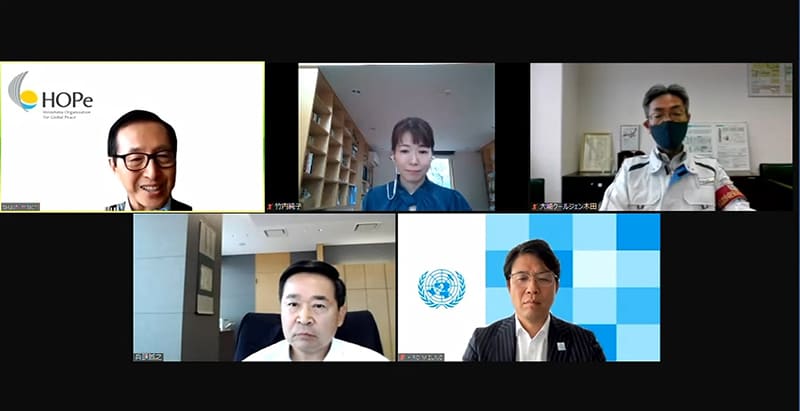
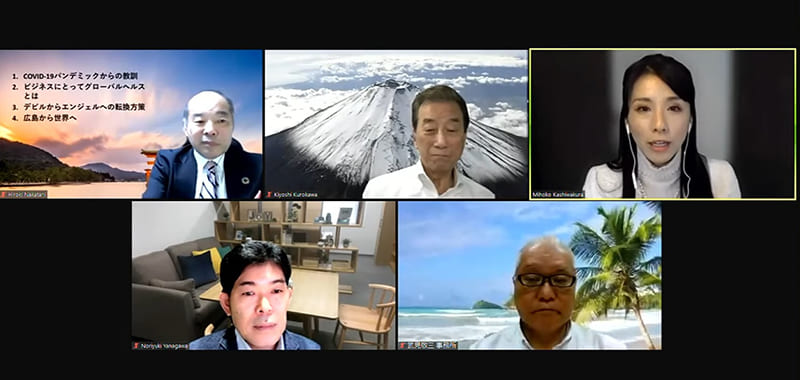
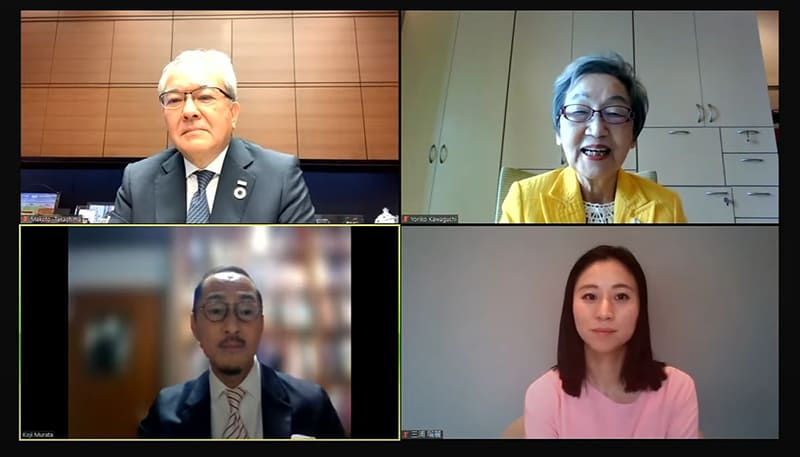
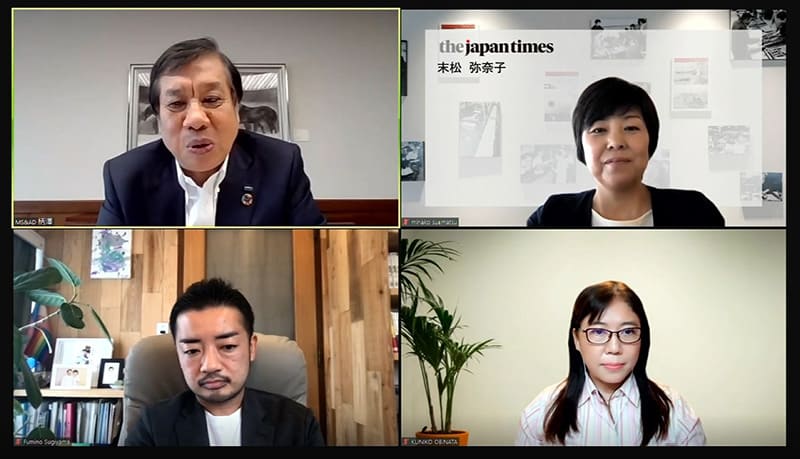
A quick glimpse of the Tokyo session
